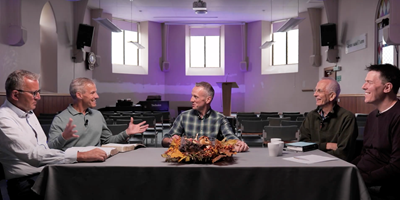As a Christian, one of the things that appeals to me most about my future in heaven is being made like Christ; no more mistakes or failures, sin-free and satisfied at last. In the meantime, despite having the above phrase from Psalm 138 underlined for many years, my default is usually, “Laura will perfect that which concerns herself”. This mindset seems to have kicked in early (even my Primary 1 report mentions I viewed mistakes as “a catastrophe!”) and as an adult I still like to get things right – ticking off daily goals helps me feel worthwhile and in control. No matter how well I succeed outwardly in putting less emphasis on doing and achieving, my inward tally never seems to switch off and it’s exhausting! However, certain events of the past 10 months have left my usual pursuit of perfection looking more like a downward spiral into uncontrolled chaos. Lying dejected one night, I picked up a half-finished book and the following leapt off the page:
“My primary sin was that I failed to believe that God is good and that His plans for my life are good . . . thoughts of an uninterrupted, self-determined day captivate my soul . . . Unbelief, the primary sin, always breeds idolatry” (Because He Loves Me by Elysse Fitzpatrick).
Desire for success, approval and control of my daily life are idols and therefore issues of the heart. I’d always assumed the problem was in my head and just part of who I am; I had never really looked at it this way before. I realised (as the book pointed out) I needed reminding of the gospel and the love of Christ. When I trusted Him for salvation it was one of the few occasions when I accepted that I had missed the mark and could do nothing to fix it. I acknowledged that God’s approval of me rested completely on the efforts of Jesus, efforts He made because, despite my sinful failings, He loves me! A beautiful Hebrew word for this love is hesed and, unlike my puny efforts, two of its defining qualities are that it is steadfast and unfailing.
If there was one person in the Bible who knew this by experience it was King David. After, arguably, the greatest failure of his life he wrote a beautiful psalm of repentance which acknowledges at the outset his complete dependence on God’s hesed:
“Be gracious to me, O God, according to your hesed; according to your abundant mercy blot out my transgressions” (Psalm 51:1 ESV margin, italics mine).
“David understands that he needs hesed the most when he deserves it the least . . . this failure provided an opportunity for him to learn more of and experience the hesed of God.” (Inexpressible: Hesed And The Mystery Of God’s Lovingkindness by Michael Card)
Was God allowing the build-up of pressures and failures in my life to remind me of His love, and that it never has depended, and never will depend, on my successes or lack thereof? Was I being given a chance here, when I felt at my most inadequate and unworthy, to experience God’s love for me more fully? When failure overwhelms, my next move is usually to pick myself up (eventually) and try harder, but always with my shortcomings lingering in my peripheral vision. Yet in Psalm 51 David is confidently declaring his transgressions (and they were pretty monumental) can be blotted out completely because such is the character of God’s inexpressible love. A verse in my daily reading hit the message home further:
“When I thought ‘My foot slips’, your steadfast love, O Lord, held me up” (Psalm 94:18 ESV).
Usually, the moments when I’m slipping are when I feel I have no right at all to cry out to God for help, but that’s actually when God’s love delights to love me all the more! It’s in the failures of life that I must come to Him, for His steadfast faithful love is the perfect balm for my weak and weary soul. I need to cast myself on His love and rest there. If, like me, you’re a to-do list addict and that all sounds a bit passive, take heart, there is something we can “do” too.
Whenever you are tempted to get out the mental ledger and balance up your daily successes and failures, why not meditate on a verse about the love of God instead? Remind yourself of the wonder of His unfailing hesed, thank Him for it, and for His Son – the ultimate expression of it. Lay hold on why He laid hold of you – because He loves you! Keep your mind and soul and heart dwelling on Him and all that He has done, and not on yourself and what you have (or have not) done! For, as Matthew reminds us, where your heart rests is where your treasure is. The more we dwell on Christ and His love the more He, rather than our achievements, becomes our treasure, and the more we realise His most valuable work is what He is doing in us not what we want Him to do through us.
I cannot put my hand on my heart and say that, following my own personal realisation, I have now mastered the art of abiding in God’s love. The pull of perfection and of ticking off outward achievements is something I suspect I’ll struggle with my whole life. However, I was encouraged when I looked up my old verse from Psalm 138 and for the first time I noticed what comes after the much-longed-for promise of perfection.
“The Lord will perfect that which concerns me; Your hesed, O Lord, endures forever” (Psalm 138:8, italics mine).

































